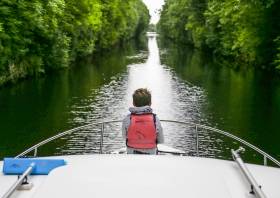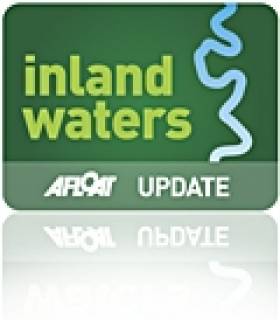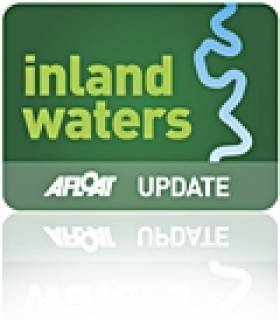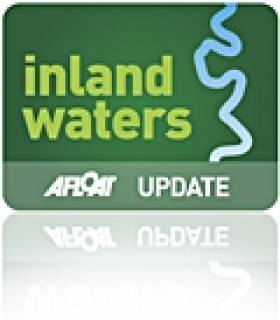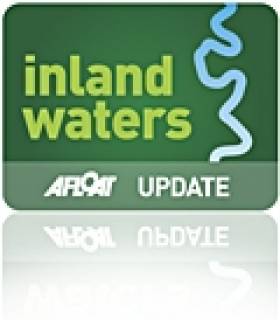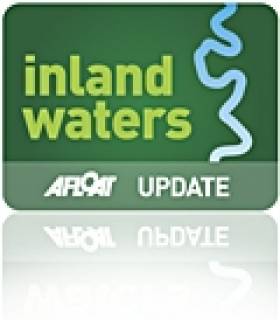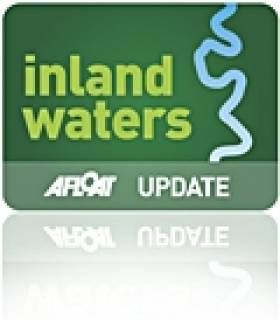Displaying items by tag: Canal
Legislating for Houseboats on Canals Near Dublin Will Be a Hot Topic
There are nearly 17,000 boats on the inland waterways, of which 9,000 are registered on the Shannon, 7,000 on the Erne, and 600 boats on the canals.
New bye-laws to control usage of the waterways are being prepared, which will have to deal with houseboats, and that is likely to be a hot topic.
Waterways Ireland, the North/South body, set up under the Good Friday Agreement, manages the waterways in Northern Ireland and the Republic and has drawn up draft Bye-Laws to replace the three sets of existing regulations controlling their use, some of which are 40 years old.
"About 150 of the boats on the canals are now being used either for full-time living or during the week by students at College"
Paddy Harkin, Inspector of Navigation at Waterways Ireland, has told me that the new Bye-Laws will have to deal with the ‘hot topic’ of houseboats on the canals, in which there has been a considerable increase close to Dublin. Pressure on housing is evident in that about 150 of the boats on the canals are now being used either for full-time living or during the week by students at College.
A public consultation, which closes on October 2, has raised several issues about the use of the waterways, including houseboats and safety and mooring in the harbours.
Listen to Paddy Harkin about the legislation plans in this clip below
You can hear the full interview on the Maritime Ireland Podcast. Details about the consultation are on: waterwaysireland.org
Inland Waterways Association Seek Dedicated Canals Act
The Inland Waterways of Ireland Association President says that the upcoming Seanad Eireann Committee Stage 3 on the Heritage Bill 2016 presents an ideal opportunity for new partnership politics to be demonstrated by the new Partnership Government.
In an IWAI statement John Dolan says 'This can be achieved by the provision of amendments when the bill is reintroduced to Seanad Éireann at 2pm Wednesday November 9th for Stage 3, including the withdrawal of the Canal Acts section from the bill to facilitate the introduction of a dedicated Canal Act with proper pre legislative consultation'
IWAI comment that if a Senator has an initial response of ‘No’ to any of the following short questions then they should be concerned regarding what is proposed in this Bill.
• Is it acceptable that persons other than An Garda Siochana or Customs Officers have the right to stop and search boaters, walkers & cyclists etc. on Waterways Ireland property such as the canal towpaths, Greenways or Blueways? (Heritage Bill 2016 Section 2 7B 1-12)
• Is it acceptable that a Body with no Corporate Governance Structure or Board will be empowered to bring in any byelaws they want with only 30 days Consultation. Local Authority elected representatives have already stated that this is insufficient time to allow them to consider any proposed byelaws? Section 2 7 (2) (a)-(e)
• Is it appropriate to legislate for the introduction of fines & regulations that are overly penal and will not encourage use of the canals and which are not in place on the other Irish inland waterways under the management of Waterways Ireland? Section 2 7 (4) & 7A (1)-(4)
• Is it acceptable to introduce legislation to apply other penalties with no independent appeal mechanism other than the courts? (Section 2 7 (4) & 7A (1)-(4)
• Is it ok to make canals less user friendly by discriminating against tourism development on our Canals by introducing a complete different set of rules, charges, regulations and fines that are not in place on the adjoining Waterways? How will this encourage tourism growth?
The Inland Waterways Association of Ireland acknowledged the support of all Senators and TD’S in the Dail and Seanad for their cross party support and pledges during the 2016 elections. Significant numbers supported the IWAI call for a dedicated Canal Bill with pre legislative consultation with canal users, local canal communities, elected Local Authority Representatives and Local Authority Management and the tourism sectors.
IWAI believes that it is a negative and imbalanced approach to introduce legislation that penalises 99% of waterways communities to address the problematic area of 1% (due to unlicensed boats, harbour hogging). These matters can be legislated for without effectively penalising the other less populated areas.
IWAI believe that any proposed legislation should:
• promote the development of the tourism potential of the canals and supports tourism initiatives on the canals, such as the IWAI Green and Silver circle trip through Dublin via both canals
• equally provide for the regulators and the users requirements
• in the absence of alternative private marinas on the canals provide for boaters moving through these linear waterways in safe areas, not isolated known problematic areas and without having to risk €150 per day fines after five days
• allow for the introduction of bye-laws that put user requirements, tourism development and local communities at the centre of the regulations in a manner that allows adequate consultation
• ensure that the enforcement & penalties regime governed by these bye-laws include a suitable independent appeals mechanism
• protect and maintain navigation heritage and usage for future generations
IWAI advise that while it would welcome and support proper regulations the proposed Heritage Bill does not put user requirements, local communities or tourism at the centre of the regulations. Rather it is a heavy handed approach that will result in a detrimental reduction of boat traffic on the canals.
The proposed Heritage Bill (2016) gives Waterways Ireland, the authority to appoint “officers” to carry out stop and search and seizure activities on boats and personal property on the Grand Canal, Royal Canal and River Barrow.
In the Republic of Ireland, search and seizure acts are limited to a number of specially trained and professional groups such as the Gardaí, Health a Safety Inspectors and Customs Officers. The boats affected by this new act include residential barges, hire boats and barges, restaurant barges, motor cruisers and fishing boats.
Boats will opt to move to the other Irish Waterways, managed by the same regulator, Waterways Ireland, where the regulations and facilities are more user friendly and where there are no oppressive fines and penalties.
The powers proposed within the new Act will affect those on the waterways of Carlow, Dublin, Kildare, Kilkenny, Laois, Longford, Meath, Offaly and Westmeath.
Inland Waterways Association of Ireland Canal Bill Election Campaign Gathers Pace
Election Candidates nationwide have being contacting the Inland Waterways Association of Ireland (IWAI) to pledge their support for an IWAI call for provision to be made for new canal bye-laws via a dedicated Canal Bill during the next Dáil, according to the IWAI.
This campaign allows Candidates an opportunity to publically demonstrate their support for the Canals and their Communities and their efforts to encourage the use and growth of the canals with legislation that is centred on the communities, users and tourism.
The pledge to date is receiving good cross party support. The IWAI web team will be updating local and national media next week on candidates supporting the pledge.
The pledge:
"IWAI request election candidates to pledge their support for an IWAI call for provision to be made for new canal bye-laws via a dedicated Canal Bill during the next Dáil when possible rather than including any future legislation in a joint Bill such as the Heritage bill 2016. Furthermore in developing The Canal (Amendment) Bill 2017 that recognition be given to the canal users, canal communities and Local Authorities adjoining the canals by way of prelegislative
consultation and scrutiny. This approach would be in line with Government reform and best practice."
Background
With no advance notice or consultation with the inland waterways stakeholders & canal communities the Heritage Bill 2016 was published on 4 January 2016.
IWAI advised that while it would welcome and support proper regulations the proposed Bill did not put user requirements, local communities or tourism at the centre of the regulations. Rather the now lapsed bill is a heavy handed approach that will result in lower boat traffic on the canals.
Prior to the 2016 Bill, in January 2014 Waterways Ireland brought forward proposals for amendments to the Canal Byelaws 1988 under the Canals Act 1986 & Maritime Safety Act 2005. IWAI campaigned vigorously during the minimal consultation period of 21 days. Public discussion in 2014 on the matter included - the Canals and Barrow as a tourism resource; queries raised in the Seanad and the Dail; County Councils input; public meetings; national and local press articles; television and radio interviews; community websites; blogs and facebook pages. These all reflected the reservations of users, communities and public representatives as to the significant impact of the draconian suggestions in the proposed bye-laws.
The IWAI campaign resulted in an invite to appear before the Oireachtas Joint Committee on Environment, Culture and the Gaeltacht.
Feedback from members of this cross party Committee who met on 25 March 2014 included:
• “I am fearful that proposals will be implemented without further recommendations” - Senator Cait Keane. Fine Gael Labour Panel.
• “I am of the view that Waterways Ireland must return to the beginning and reconsider this matter from a very practical viewpoint. What is proposed is going to lead to the closure of the Canal” - Deputy James Bannon. Fine Gael Longford - Westmeath
• “People should not feel pushed out of an activity they have grown up with, love and wish to pass on to other generations and the community to help local economies with the tourism income it can provide” -
Deputy Barry Cowen. Fianna Fail Laois - Offaly
• “The Bye-laws will impact heavily on a small number of people” - Deputy Catherine Murphy. Independent Kildare North
• “The huge increase in some fees is unacceptable and there is serious concern that the proposed fees will
damage tourism and drive people from the waterways” Deputy Sandra McLellan. Sinn Fein Cork East
• “The new bye-laws will make exacting demands on users of the Canal” - Deputy Seamus Kirk. Fianna Fail. Louth
• “The five day rule, which I believe is completely unworkable” - Deputy Ann Phelan. Labour Carlow Kilkenny
The 2014 proposed byelaws if passed would not have had any validity as noted this year on the Waterways Ireland website “The Minister was subsequently advised by the Office of the Attorney General that amendments to the primary legislation governing the bye-laws (the Canals Act 1986) would be necessary to ensure that the new bye-laws would not be ultra vires.” The proposed invalid bye-laws were published with no prior consultation and a short public consultation period of just 21 days, resulted in over 2300 submissions on the issue.
The current position
Two years later and it seems no lessons have been learned on how to communicate with the customer and communities along the canals.
The powers proposed within the new Act will affect those on the waterways of Carlow, Dublin, Kildare, Kilkenny, Laois, Longford, Meath, Offaly and Westmeath. The bill had Stage 2 approval in the Seanad, but is now lapsed due to the dissolution of the Dáil this month.
Future Outlook
Politically, this is now a very big issue. It is going to feature highly as candidates face into elections this spring. The IWAI have gained the interest of local, regional and national politicians on this matter to date, who on behalf of their constituents, want to develop, not constrict, canal use.
Kildare County Council Rejects Canal Bye–Law Amendments
#inland – The IWAI has welcomed Kildare County Council's rejection of the Waterways Ireland proposed Canal Bye-law amendments passed unanimously on Monday 24 February 2014.
Speaking this week, Carmel Meegan, President of The Inland Waterways Association of Ireland (IWAI) welcomed the unanimous support from Kildare's democratically elected representatives in the Council and added that it provides further proof that "the proposed bye-laws do not put user requirements, tourism development and local communities at the centre of the regulations."
The motion was moved by Councillor John McGinley.
It has been confirmed that at the end of the brief public consultation period of 21 days on Feb 3rd communities along the waterways had sent over 2100 submissions of concern to Waterways Ireland, with over 1800 of these being passed to IWAI (for IWAI to submit to Waterways Ireland). A number of international and national organisations and community groups have allowed the IWAI to publish their submissions on our campaign web page at www.iwai.ie.
Concerns continue to be aired including questions from members of the Seanad and the Dail; national and local press articles; television and radio interviews and features; community websites; blogs and facebook pages, in the Canals and Barrow as a national resource.
Politically, this has grown to be a very big issue nationally and regionally and is featuring highly as politicians face into local elections this summer.
Mr. Jimmy Deenihan, TD, Minister for Arts, Culture and the Gaeltacht has responsiblilty for signing any new regulations into law.
The bye-laws should concern Mr. Leo Varadkar, TD, Minister for Tourism, Transport and Sport as to the potential of the 'Green and Silver' navigation route, from Dublin to the Shannon via the Grand or Royal Canals and vice versa. This is promoted by Dublin IWAI.
Further work of Mr. Phil Hogan, TD, Minister for Environment, Community and Local Government should not be ruined by Waterways Ireland doing their own thing with a national resource. The Local Government Reform Bill 2014 give localities more power.
Additionally, economic opportunities for enterprise development on inland navigations should interest Mr. Richard Bruton, TD, Minister for Jobs, Enterprise and Innovation.
The boating community is not averse to appropriate management, facility provision, and access to waterways. But boats are key attractions, as the lifeblood of the navigations, and need to be welcomed.
World Canal Conference to be Staged in Milan
#canal – The 27th World Canals Conference, previously staged in Ireland, will be held at the Lombardy Region 'palace' in Milan from September 1-4. The conference offers a unique opportunity to meet key players in a wide range of developments on canals and rivers, from the smallest canals in historic city centres to high-capacity waterways needed for Europe to maintain her industries and survive world competition.
Italy is at the heart of contemporary trends in both areas, with ground-breaking projects on Milan's historic canals, as well as major investments currently under way or planned on the Ferrara waterway, the river Po and two canals - Venice-Padova and Milan-Cremona-Po - that have been left incomplete for 40 years!
MN71: Royal Canal Kilcock Canal Festival & MN72: Shannon Navigation Lough Ree (south) Hexagon Shoal Buoy - Out of Position
MARINE NOTICE
No. 71 of 2013
Royal Canal
Kilcock
Canal Festival
Waterways Ireland wishes to advise masters and owners that the Kilcock Canal Festival will take place over the weekend of 22 nd & 23 rd June.
Events taking place may impede through traffic for short periods. Masters should plan accordingly and are requested to note advice and directions of event marshals.
Waterways Ireland thanks its customers for their cooperation .
Charles Lawn
Lt Cdr (rtd)
Inspector of Navigation
21 June 2013
Tel: 00 353 (0)90 6494232
Fax :00 353 6494147
MARINE NOTICE
No. 72 of 2013
Shannnon Navigation
Lough Ree (South)
Hexagon Shoal Buoy – Reported Out of Position
Waterways Ireland wishes to advise masters and owners that this buoy has been reported out of position and may have moved closer to the shoal itself.
Masters area requested to navigate with caution and give the buoy a wide berth.
Charles Lawn
Lt Cdr (rtd)
Inspector of Navigation
21 June 2013
Tel: 00 353 (0)90 6494232
Fax :00 353 6494147
Rent & Navigate Your Own Canal Barge Through Dublin City
#dublinbarge – After one hour personal instruction on how to drive, moor and navigate a barge through a lock, you can drive your very own barge in Dublin city centre.
The barge 'Scéal Eile' is a new and exciting form of accommodation offered at Grand Canal Dock, Dublin 2.
Dublin Barge Hire is Dublin city centre's first self-catering cruising barge.
Not only is this an exclusive and unique place to stay, the barge is a form of transport as well.
Guests will have access to the secure and serviced Marina in Grand canal Dock and from here you can navigate through seven locks up to Portobello.
It is a four hour round trip along an historic stretch of canal, originally opened in 1796.
The barge has a capacity of 4 adults and 2 children. For two nights based on two people sharing the package is priced at €300.
'Scéal Eile', a 50 x 10 foot (15 x 3.1 m) barge was built in 2006 to a high specification according to its owners. They say the barge has a warm inviting interior and a comfortable living space that makes this self-catering barge an environment for a holiday break.
It contains a multi-fuel stove with a back boiler which makes a stay on the barge during winter a cosy experience.
More on www.dublinbargehire.com
Lough Allen Canal Closes for Bank Repair
#CANAL – Works have commenced to repair the canal bank due to road slippage at Drumhauver, north of Drumleague Lock. The Lough Allen Canal from Drumleague to Acres Lake will be closed to boat traffic until 10th February 2012. Passage may be available from time to time during the period by prior arrangement through the Lock keeper at Drumshanbo Lock (353-(0)86 8127522. Masters are advised to proceed with due caution when navigating this stretch of waterway.
Heritage Boatmen Honoured with River Barrow 2011 Presentation
This year we celebrate the 220th anniversary of the opening of the Barrow Navigation. This linked the Grand Canal with the rivers Barrow, Nore and Suir, and opened up a large area of the hinterland to the great ports of Dublin and Waterford. When the canals closed to commercial traffic in the 1960s it was feared that all use of the navigation would soon cease. Indeed, non-commercial traffic did become very light, but for the vision of a few people and now, following excellent remedial work by Waterways Ireland on the Barrow Line and Barrow River, we welcome a new era for this navigation, one which will bring life and vitality once again to the waterway and the towns and villages along the system.
A hundred years ago, 1200 boatmen were engaged in the business of transporting cargo, connecting people in inland towns with those in Irish ports and in turn linking them to the great sea ports of the world. Today, many of their descendants live along our inland navigations.
Three of these great canal boats, numbers 72M, 68M and 107B, escorted by a flotilla of other HBA boats will, over the next few months, travel the entire navigation including Carlow, Waterford, Carrick on Suir, Inistioge and all points in between. The crews are anxious to meet with those whose families had connections with the commercial trade along the waterway, and perhaps even re-unite some long retired boatmen with their old boat. In particular, a gathering of the retired boatmen will take place in Graiguenamanagh on Saturday 21st May. Waterways Ireland together with the Heritage Boat Association will make a presentation to each of the boatmen to mark Barrow 2011, the celebration of the 220th anniversary of the opening of the Barrow Navigation.
The following are the expected arrival times:
Goresbridge: Saturday 30th April from 14:00
Graiguenamanagh: Sunday 8th May from 14:00
Waterways Ireland to Apply 'Five Day Rule' This Month
Waterways Ireland has reminded all Masters and users of the Grand Canal on Ireland's inland waterways that it intends to move vessels double or tripled berthed on the Grand Canal and Shannon Harbour that contravene the five day rule.
The enforcement of SI No. 24/1988: Canals Act, 1986 Bye Law (25 ,1 (d)) applies to all hard edged moorings in the harbour area with effect from 17th March 2011.
At Tullamore this area is deemed to be between White Hall Bridge and Waterways Ireland Offices.
At Shannon Harbour The area is deemed to be between 35th Lock Eastwards to Griffith Bridge.This enforcement will clear the channel for navigation and facilitate the movement of both visiting and Shannon Harbour based vessels. Alternative berthing is available upstream of Griffith Bridge. Boats should only be moored singly on either side of the canal to permit the safe passage of craft. Bye Law (25, 1 (b) states that sufficient space must remain so that two vessels can pass at the same time. Berthage is also available on the North Bank between 35th and 36th Lock.
Vessels in contravention of this bye-law will be moved East or West of the area as space becomes available. Non permitted vessels will also be moved.
This enforcement will facilitate the movement of visiting vessels. Vessels should only moor directly onto quay walls and not double and triple berth. Alternative berthing is available on the main line.
Vessels in contravention of this bye-law will be moved onto the main line. Non permitted vessels will also be moved.
Owners and Masters of vessels are requested to assist in this enforcement in order to open the area to more vessels and facilitate the proper use of the harbour.



























